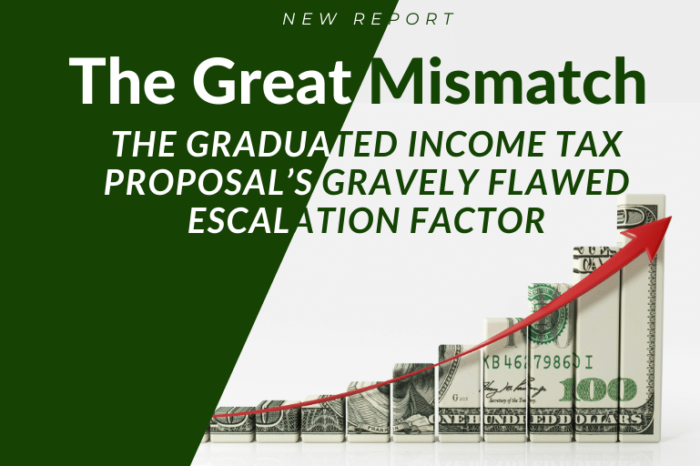Study: Graduated Income Tax Proposal Fails to Protect Taxpayers from Bracket Creep
BOSTON – The state constitutional amendment proposed by the Service Employees International Union and the Massachusetts Teachers Association to add a 4 percent surtax to all annual income above $1 million purports to use cost-of-living-based bracket adjustments as a safeguard that will ensure only millionaires will pay. But historic income growth trends suggest that bracket creep will cause many non-millionaires to be subject to the surtax over time, according to a new study published by Pioneer Institute.
If Massachusetts incomes and prices continue to grow at their current rates, households currently earning $700,000 a year would be subject to the surtax by 2038, and those currently earning $600,000 would be subject to it by 2044. This amounts to punishing future wage gains among a demographic that is not acknowledged as a target for the tax hike.
“Whether willfully or not, the proponents insisted on an escalation factor that will be punitive to many more Massachusetts taxpayers than is part of their pitch,” said Greg Sullivan, who co-authored “The Great Mismatch: The graduated income tax proposal’s gravely flawed escalation factor,” with Andrew Mikula. “If the measure had been tied to the median household income, it would have better protected taxpayers from bracket creep. It would also have ensured that income, the commodity being taxed, was the sole basis for the adjustments. If we’re levying a tax on income, we should index the escalation factor to income.”
Cost-of-living adjustments in the graduated income tax proposal are tied to the chained Consumer Price Index (CPI) among all urban consumers, as calculated by the federal Bureau of Labor Statistics. While the CPI is also used as an escalation factor at the federal level, Congress frequently adjusts tax rates and brackets to meet the needs of the times. By contrast, Massachusetts’ proposed surtax would lock the CPI escalation method into the state constitution, making it very difficult to adjust as needed.
To illustrate the discrepancy between growth of the CPI and wage growth, the study contrasts what state legislators’ wage gains would have been between 2017 and 2021 if they were tied to the CPI (6.42 percent) with the actual growth rate (12.77 percent), which uses an income-based index. It also shows that from 2014 to 2019, when the state’s economy was at peak health, mean household income among the wealthy rose nearly five times faster than the CPI — 35.7 percent vs. 7.5 percent.
In the long term, the difference between cost-of-living increases and wage increases is less stark. However, the report also shows that between 1989 and 2019, wage growth exceeded the cost of living growth rate for every income quintile in the state.
Since 1999, the year the chained CPI was introduced, aggregate wages and salaries in Massachusetts have more than doubled, while the CPI has grown by 44.3 percent. That means wages and salaries have grown at more than twice the rate of CPI.
“We are debating the merits of a constitutional amendment,” said Pioneer Institute Executive Director Jim Stergios, “and this study adds to the long list of ways in which the proposal has not been vetted for its long-term implications.”
Growth in the CPI has been especially slow in recent years, with the twin crises of the Great Recession and COVID-19 pandemic leading to weak demand. In the coming decades, the continued disparity between rising wages and rising prices could push many Massachusetts residents into a higher tax bracket.
About the Authors
Gregory Sullivan is Pioneer’s Research Director. Prior to joining Pioneer, Sullivan served two five-year terms as Inspector General of the Commonwealth of Massachusetts and was a 17-year member of the Massachusetts House of Representatives. Greg is a Certified Fraud Investigator, and holds degrees from Harvard College, The Kennedy School of Public Administration, and the Sloan School at MIT.
Andrew Mikula is Economic Research Analyst at Pioneer Institute. Mr. Mikula was previously a Lovett & Ruth Peters Economic Opportunity Fellow at Pioneer Institute and studied economics at Bates College.
Get Updates on Our Economic Opportunity Research
Related Content





